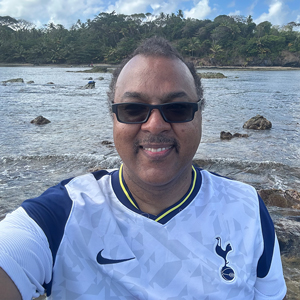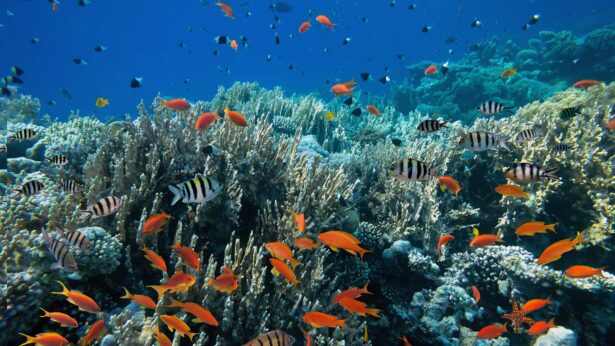
Stanton Belford’s love of marine biology began with a salty gulp of ocean water and a high school field trip.
Belford (Southern ’00, ’05) is an associate professor of biology and chair of the School of Mathematics and Science at UT Southern, where he’s been on the faculty for more than 11 years. He teaches undergraduates biology, ecology and “all the ‘ologies,’” he quips.
An expert in coral reef research and biodiversity conservation, Belford has achieved career success, in part, because he’s been willing to take some chances. Perhaps his biggest gamble was the one that jump-started it all: Leaving his home in Trinidad and Tobago of the southern Caribbean to move to Pulaski as a first-generation college student in 1996.
Now You Will Never Forget
Belford was born in Arima, a small inland town in Trinidad. Some of his favorite childhood memories are of his father, Henry Belford, taking him to the nearby northern coastal village of Blanchicheusse to enjoy local specialties, like cassava pones, a sweet treat made with grated coconut, grated cassava (yuca root) and warm spices.
Once while they were there, Henry put young Stanton on his shoulders and waded into the ocean. He scooped up a handful of ocean water and told his son to take a sip. Belford remembers the water’s awful taste and his father’s words: “Now you will never forget the ocean.”
A few years later, in high school, Belford’s science class travelled to the coast to assess the biodiversity of the coral reef. That experience made him thirst for more reef explorations.
Click to Expand Images
Belford earned a soccer scholarship to attend Martin Methodist College, now UT Southern. Had he stayed in Arima, he knows he might have been caught in the same web of crime and drugs that trapped many of his childhood friends.
At Martin Methodist, Belford completed bachelor’s degrees in behavioral sciences and in biology. He completed his master’s degree at Middle Tennessee State University and his doctorate at Auburn University.
A Snapshot of Reef Health
Belford has studied coral reef biodiversity in the Toco area of Trinidad for more than 20 years. He makes regular trips there to collect samples.
“Knowing what’s out there is really important. It gives you a snapshot of reef health,” he says, explaining that changes in coral wildlife provide insight into bigger issues, like climate change.
When possible, he takes students to help. “I am so focused on the things I know; I bring students and childhood friends to help me. Their eyes haven’t seen what I’ve seen,” he says.
Belford uses sophisticated scientific techniques, like DNA barcoding, to identify and catalog the species he finds. DNA barcoding involves collecting a sample (like a sea urchin spine), extracting DNA from that sample, and amplifying and sequencing the DNA into a barcode that can be compared to a large database of barcodes.
Partnering with a professor from Trinidad and a scientist from the Black in Marine Science organization, Belford is now experimenting with environmental DNA testing, which uses a sample of seawater, sand, soil or air. The process isolates DNA from microscopic bits of scales, feces, mucous, blood and other biological bits from individual creatures. Researchers can then compare their findings with international DNA databases to determine what creatures were present in that place at that time.
Introducing Students to the Reef
While marine biology is Belford’s research passion, his favorite part of being a professor is mentoring students—introducing them to marine biology and scientific tools like DNA barcoding while helping them find their own passion for science.
Before the pandemic, Belford took five small groups of students on study abroad trips to Trinidad to survey the reef. While the pandemic put the trips on hold for a while, they have now resumed. In March, he took one student; in May, he took three.
The students—some who have never seen an ocean before—stay about a week. They collect samples and observe wildlife on the coral reef. Belford also introduces them to other island wildlife. With luck, they get to see leatherback sea turtles, the largest turtles on the planet. Supervised by a turtle expert, they may even get to hold a leatherback egg or a wayward hatchling that needs help finding the ocean. He’s also taken students on a boat to view the nesting grounds of native birds, like flamingos and scarlet ibises.
Belford requires students to keep trip journals and reflect about what the experiences mean to them. “I tell my students, ‘I am training you as if you are a scientist, a colleague. You’re not just getting a degree; you are doing something that can make a difference in the world.’”
Destiny Newman, of Murfreesboro, who will graduate this summer with her bachelor’s degree in biology, has worked with Belford since her freshman year. Belford introduced her to DNA sequencing and barcoding.
Using spines Belford had retrieved from red and black rock-boring sea urchins (Echinometra lucunter) living on the reef in Trinidad, Newman conducted molecular analysis that showed the different-colored urchins were identical—except for one DNA building block. Armed with that knowledge, researchers can now focus on “evolutionary pressures and functional implications of the (DNA) variation, whether focused on habitat preference, response to environmental changes or reproductive success,” Newman concluded in her project.
Newman’s work won third place at the Tennessee Academy of Science conference held at Lincoln Memorial University. She also received the $100 Henry Belford Award, created by Stanton Belford several years ago to honor his father. “Receiving the award makes me want to cry,” Newman says. “It makes me feel like he believes in me.”
The award reflects the lessons Belford’s father taught him—and the lessons he wants to pass on to students, like Newman.
“I remember my dad putting me on his shoulders to be brave. I remember him giving me water from the ocean to drink as a means to try something different,” Belford says. “I give the award to a student who has stepped outside their comfort zone in their research and who has found something different as a result of their persistence.”
After all, Belford says, “Science has a peculiar way of showing the hidden secrets if you just take a chance.”

